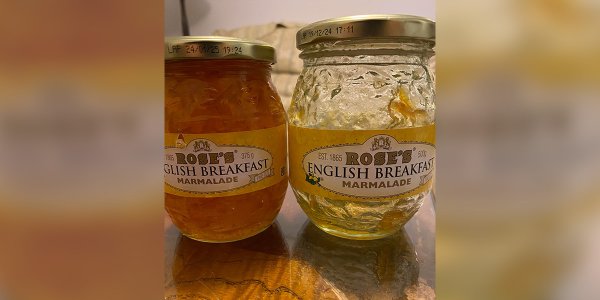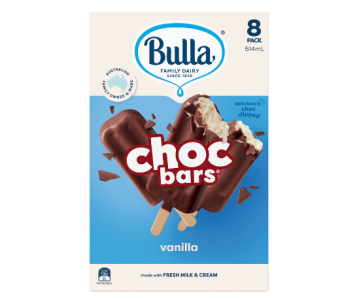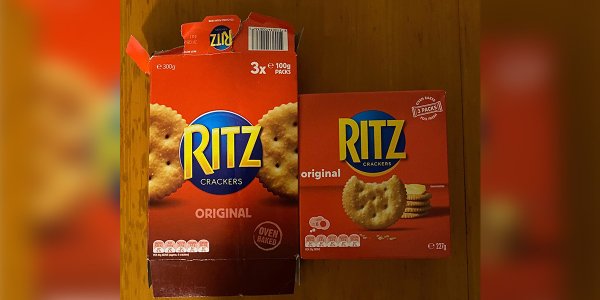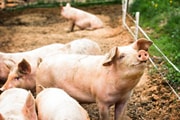Are you paying more for less? Discover how 'shrinkflation' is silently hitting your wallet
Members, we know how hard it must be to make ends meet in today's climate. Prices are forever rising, and money is increasingly hard to come by. The cost of living is ever-evolving, and what used to be affordable is becoming increasingly out of reach.
While you may think you have the perfect system to keep costs low, something may be slipping your radar at the grocery store–something you've probably heard whispered of but never paid too much mind to.
We're talking about 'shrinkflation', a stealthy and deceptive technique often employed by food manufacturers to shrink their products' size while keeping the same prices. The goal is to avoid drawing too much attention when prices are raised.
Hundreds of concerned consumers have spoken out about these shrinking products, with the frequently cited example being jam jars from the well-known brand Rose's. These have been downsized from 500g to 375g without any price reduction, according to reports.
One avid shopper, who had been buying Rose's marmalade for the last 50 years, said the new smaller sizes had caused them to gripe about the price every morning.
'Same price, less product,' they said. 'Dishonest and disappointing.'
A similar instance has been shared on social media by another customer. The post says, ‘Sydney Cost of Living: Same Product, Same Price, 125g less.’
Another comment says, ‘And quite often we don't notice with things like jams until we do put the old jar next to the new one. It's going to get to the point that they've shrunk the jar to the single-serve sample size.’
Shrinkflation has been around for decades, but it's seen an upsurge recently as manufacturers battle rising costs. The process involves reducing the size of food items and then sneaking the new, smaller-than-usual products onto the shelves in the same packaging.
Rose’s manufacturer Hain Daniels Group has yet to respond to these observations.
This means unsuspecting customers receive less for their money, or they have to buy more than usual to make up for the difference.
This phenomenon is so pervasive that the Bureau of Statistics representative noted, ‘While we don’t have exact figures available, it would be fair to say we’ve seen a rise in instances of this occurring.’
Often, there are no signs the customer is getting a diminished product or service. The packaging sometimes includes words like 'new and improved' that hide the reality of what you're buying.
In addition to the jam jar brand, numerous readers pointed out that the box of Pears soap, containing three bars, has decreased in weight from 125g to 100g–a 20% difference.
Unilever, the company that owns Pears, also has yet to release a statement.
In addition, Bulla Dairy Foods reportedly reduced their choc bar packs from ten to eight without changing the price tag–something that the Bulla chief executive, Allan Hood, publicly confirmed.
‘It is our priority to ensure our customers know what they are buying at the time of purchase and despite the rising cost of ingredients, this is the only [item] in the Bulla portfolio to have a reduction in pack size,’ Hood said.
Unfortunately, items that have been around for a long time seem to generate the most anger when it comes to ‘shrinkflation’–things like Ritz crackers, the classic Mars bar, Pringles chips, and blocks of Cadbury chocolate.
In a social media post, a user shared a photo that shows a Ritz comparison.
‘I think the packet on the right might even have been more expensive, but even assuming the same price, that’s still a 32% price increase,’ the user pointed out.
‘Yep they dropped a few months ago and I stopped buying in protest,’ a comment under the post said.
Mondelēz International, the company that owns Ritz, noted supply chain difficulties as a justification for shrinking their product. A representative explained:
'The last few years have been extremely challenging for food manufacturers and like many, we have experienced significant supply chain challenges and absorbed rising commodity and input costs.'

Have you noticed the same in your local supermarket, dear members? Share your experience in the comments below!
While you may think you have the perfect system to keep costs low, something may be slipping your radar at the grocery store–something you've probably heard whispered of but never paid too much mind to.
We're talking about 'shrinkflation', a stealthy and deceptive technique often employed by food manufacturers to shrink their products' size while keeping the same prices. The goal is to avoid drawing too much attention when prices are raised.
Hundreds of concerned consumers have spoken out about these shrinking products, with the frequently cited example being jam jars from the well-known brand Rose's. These have been downsized from 500g to 375g without any price reduction, according to reports.
One avid shopper, who had been buying Rose's marmalade for the last 50 years, said the new smaller sizes had caused them to gripe about the price every morning.
'Same price, less product,' they said. 'Dishonest and disappointing.'
A similar instance has been shared on social media by another customer. The post says, ‘Sydney Cost of Living: Same Product, Same Price, 125g less.’
Another comment says, ‘And quite often we don't notice with things like jams until we do put the old jar next to the new one. It's going to get to the point that they've shrunk the jar to the single-serve sample size.’
Shrinkflation has been around for decades, but it's seen an upsurge recently as manufacturers battle rising costs. The process involves reducing the size of food items and then sneaking the new, smaller-than-usual products onto the shelves in the same packaging.
Rose’s manufacturer Hain Daniels Group has yet to respond to these observations.
This means unsuspecting customers receive less for their money, or they have to buy more than usual to make up for the difference.
This phenomenon is so pervasive that the Bureau of Statistics representative noted, ‘While we don’t have exact figures available, it would be fair to say we’ve seen a rise in instances of this occurring.’
Often, there are no signs the customer is getting a diminished product or service. The packaging sometimes includes words like 'new and improved' that hide the reality of what you're buying.
In addition to the jam jar brand, numerous readers pointed out that the box of Pears soap, containing three bars, has decreased in weight from 125g to 100g–a 20% difference.
Unilever, the company that owns Pears, also has yet to release a statement.
In addition, Bulla Dairy Foods reportedly reduced their choc bar packs from ten to eight without changing the price tag–something that the Bulla chief executive, Allan Hood, publicly confirmed.
‘It is our priority to ensure our customers know what they are buying at the time of purchase and despite the rising cost of ingredients, this is the only [item] in the Bulla portfolio to have a reduction in pack size,’ Hood said.
Unfortunately, items that have been around for a long time seem to generate the most anger when it comes to ‘shrinkflation’–things like Ritz crackers, the classic Mars bar, Pringles chips, and blocks of Cadbury chocolate.
In a social media post, a user shared a photo that shows a Ritz comparison.
‘I think the packet on the right might even have been more expensive, but even assuming the same price, that’s still a 32% price increase,’ the user pointed out.
‘Yep they dropped a few months ago and I stopped buying in protest,’ a comment under the post said.
Mondelēz International, the company that owns Ritz, noted supply chain difficulties as a justification for shrinking their product. A representative explained:
'The last few years have been extremely challenging for food manufacturers and like many, we have experienced significant supply chain challenges and absorbed rising commodity and input costs.'
Key Takeaways
- The concept known as 'shrinkflation', where food manufacturers reduce product size but maintain the same price, is causing frustration among customers.
- Consumers are specifically unhappy with brands such as Rose’s, for reducing their jam sizes from 500g to 375g with no corresponding price decrease.
- Inflation and increasing costs are leading food companies to use downsizing to maintain or increase profits.
- Products like Pears soap, Bulla Family Dairy Choc Bars, and Ritz crackers have significantly shrunk, causing customer discontent.
Have you noticed the same in your local supermarket, dear members? Share your experience in the comments below!











